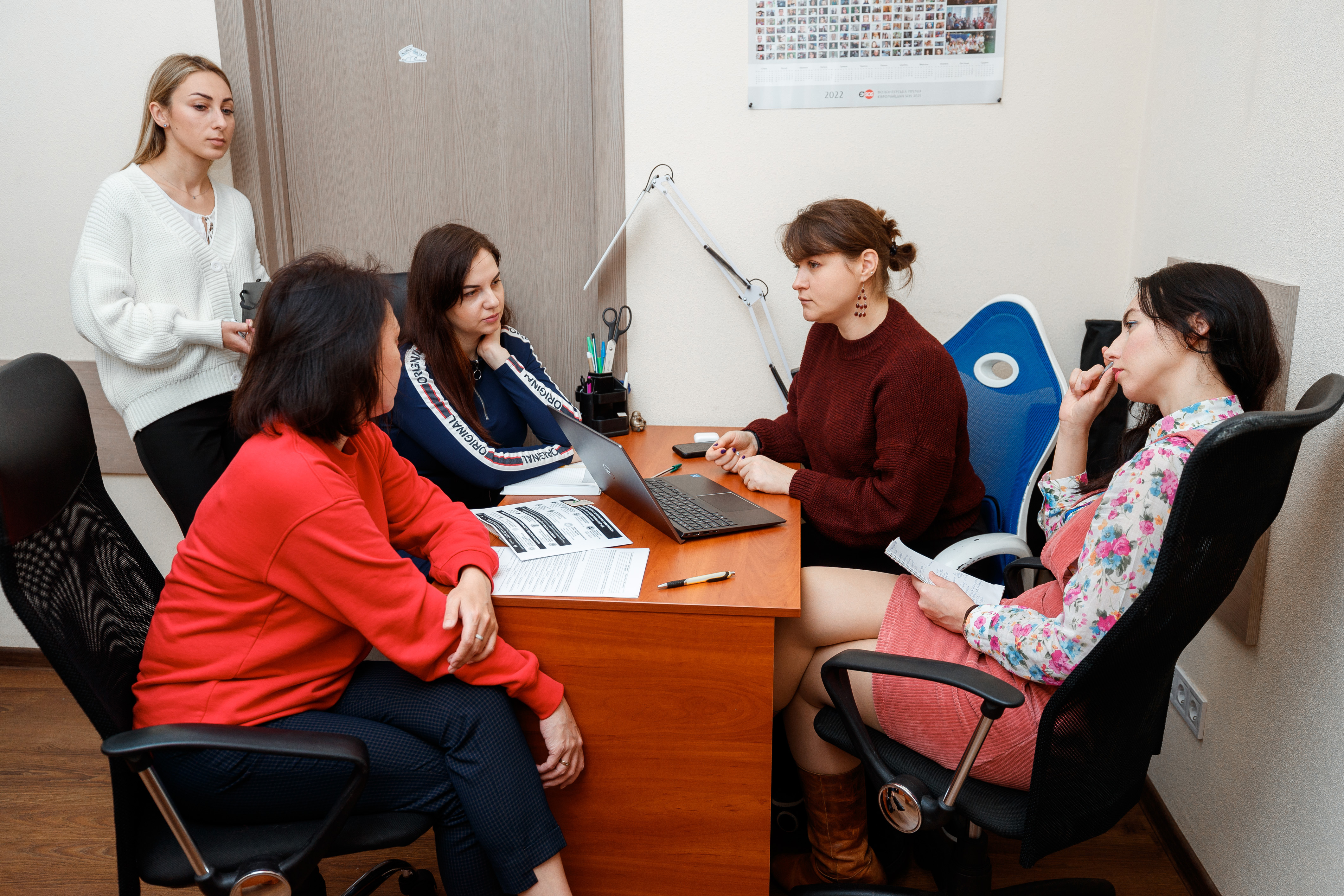From call-center to Nobel Peace Prize: Meet human rights activist Oleksandra Romantsova
March 17, 2023

Oleksandra Romantsova in Kyiv, Ukraine.
Economist Oleksandra Romantsova had been building her career at an international bank when the Maidan protests turned her life upside down.
Appalled by the brutal dispersal by riot police of a peaceful student camp in Kyiv in late 2013, Romantsova realized she wanted more than just attend protest rallies. As a volunteer, she joined the Center for Civil Liberties, where she first learned about human rights. Later, she became its executive director - and a world-renowned human rights advocate.
“Defending human rights is my system of values,” Romantsova, 38, said. “Back then I understood this.”

At work at the office of the Center for Civil Liberties
Romantsova started working at a call center where the Center for Civil Liberties provided free legal support for arrested activists. Every day she answered calls from 4:00 to 8:00 AM, before going to work at the bank with less than four hours of sleep.
She was so exhausted that she overslept the evening of 21 February 2014, when protesters forced President Viktor Yanukovych to flee to Russia. Shortly thereafter, the Autonomous Republic of Crimea was under the temporary occupation of the Russian Federation. Romantsova applied to UNDP on behalf of the Center for Civil Liberties for a grant to document war crimes.
The Center won the grant and Romantsova spent the next three years traveling first to Crimea and then to the conflict-torn Donetsk and Luhansk regions in eastern Ukraine to register and investigate cases of illegal abductions, torture and murder.
"We were lucky not to hit a landmine after we poked around everywhere without having any security experts," she said about her expedition to the city of Sloviansk, which had returned to Ukrainian government control.
Romantsova interviewed victims and witnesses of war crimes, visited former torture chambers, and later brought and showed European politicians the atrocities of the armed conflict. Although she was doing all she could at the time, she knew it was not enough.
After traveling to the Balkans to learn from local experts about the lessons of the war in former Yugoslavia, she started teaching Ukrainian journalists, officials and priests how to document war crimes in Ukraine. She led the Kyiv School of Human Rights and Democracy, funded by another UNDP grant, as a place where every Ukrainian could learn about the principles of human rights.
Over the years of war, Romantsova experienced post-traumatic stress disorder, physical danger and the hardship of traveling to conflict zones. Still, despite the exposure to conflict and numerous human rights abuses since 2014, the full-scale Russian invasion that started on 24 February 2022 was a big blow to her.
Together with the founder of the Center for Civil Liberties Oleksandra Matviichuk and six colleagues, Romantsova decided to stay in embattled Kyiv, spending days conducting interviews with foreign media about the situation in Ukraine and providing instructions and guidance to everyone who wanted to document war crimes.
“We immediately realized that now there is a huge territory affected by war crimes,” she said. “So we had to figure out how to multiply the process of documenting them.”
Romantsova and her colleagues lived together in a house with blackened windows, without going outside for more than a month and not being able to sleep because rocket attacks mostly hit at night. “We were often giving interviews for a TV show, and suddenly there was ‘bam!’ ‘bam!’ In these cases, I always told them, ‘As you can see, I’m not at a military base, but they are shelling us.’”
Romantsova said she cooked for the entire team, a skill she learned from her grandma, a professional chef. “This not only helped my colleagues,” she said, “but cooking also calmed me down.”
The Center for Civil Liberties joined a coalition of Ukrainian human rights organizations who aim is to bring to justice any and all perpetrators responsible for war crimes in Ukraine. Over the first year since the invasion began, their coalition has registered more than 33,000 potential violations, which include, she said, “war crimes, crimes against humanity, crimes of aggression and genocide.”

Oleksandra Romantsova and the team at the train station
In October, Romantsova was stunned to receive world recognition for her efforts. A secretary of the Nobel Committee announced to her by phone that the Center for Civil Liberties was awarded the Nobel Peace Prize along with the Russian organization Memorial and jailed Belarusian human rights activist Ales Bialiatski.
“I could only say ‘ok’. I was so overwhelmed with emotions that I forgot my English. And in the end, I even cried,” she remembered.
Romantsova was in Warsaw, getting ready for a long train trip back to Kyiv with Marviichuk. When they met and Romantsova shared the news, Matviichuk was so surprised that she wondered if it wasn’t a phone prank. But soon their phones were unstoppable with congratulations calls.
“We were running to the train in casual sports suits,” she said, “and then I thought: this is what modern Nobel laureates must look like.”

 Locations
Locations